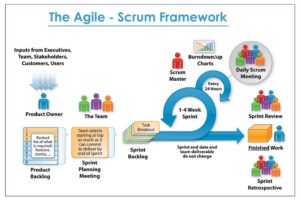Agile software development comprises various approaches to software development under which requirements and solutions evolve through the collaborative effort of self-organizing and cross-functional teams and their customer(s)/end user(s).[1] It advocates adaptive planning, evolutionary development, early delivery, and continual improvement, and it encourages rapid and flexible response to change.[2][further explanation needed]
The term agile (sometimes written Agile)[3] was popularized, in this context, by the Manifesto for Agile Software Development.[4] The values and principles espoused in this manifesto were derived from and underpin a broad range of software development frameworks, including Scrum and Kanban.[5][6]
While there is much anecdotal evidence that adopting agile practices and values improves the agility of software professionals, teams and organizations, some empirical studies have disputed that evidence.[7][8]


Recent Comments